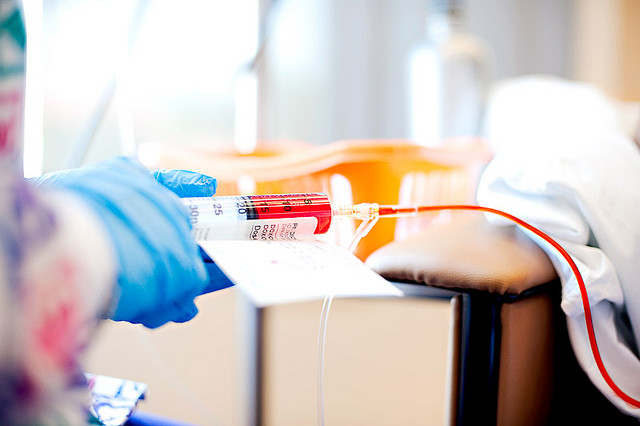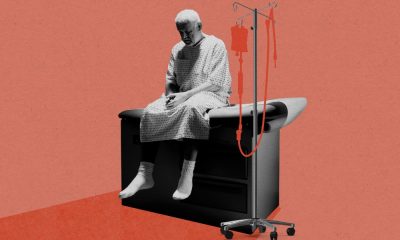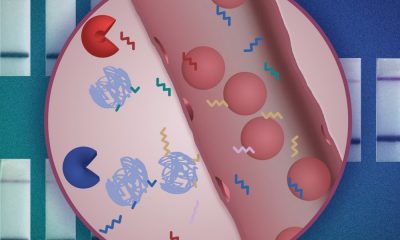The following are summaries of some of the cancer research advances being presented the annual meeting of the American Society of Clinical Oncology (ASCO) in Chicago.
Liquid biopsy shows who can skip chemotherapy after colon surgery
Liquid biopsy can help identify patients with stage II colon cancer who do not need chemotherapy to prevent recurrence after surgery, according to results of a 455-patient study presented on Saturday.
Among patients in the study who were tested via liquid biopsy, 15% ended up receiving chemotherapy versus 28% whose risk was determined using standard diagnostics. Two years later, rates of survival without recurrence were similar, at roughly 93%, in both groups, the researchers reported at ASCO 2022 and in The New England Journal of Medicine.
Very few patients with these cancers – which have grown through the colon wall but not reached the lymph nodes – will actually benefit from adjuvant, or post-surgery, chemotherapy. But “every patient struggles with the question of whether to skip it,” especially those considered at low or intermediate risk of recurrence based on surgeons’ observations or analysis of the excised tumor, said study leader Dr. Jeanne Tie of the Peter MacCallum Cancer Centre in Melbourne, Australia.
Most vulnerable to recurrence are patients with hard-to-find cancer cells remaining after surgery. Those cells shed genetic material into the blood that can be picked up by liquid biopsies. In the study, doctors determined which patients should receive chemotherapy in one group based on whether tumor genetic material was seen in liquid biopsies. That was compared with another group whose chemotherapy decision was determined by traditional clinical risk factors.
Chemotherapy is physically and financially toxic, Tie said. With this approach, “we are selecting the right people to treat,” she said. “Patients are so relieved when we tell them they don’t need chemotherapy.”
Acetaminophen interferes with cancer immunotherapy
The popular painkiller and fever reducer acetaminophen interferes with a widely-used class of cancer immunotherapies, known as immune checkpoint inhibitors (ICI), significantly limiting their affect, according to a study that will be presented at the ASCO meeting on Monday.
Drugs in the ICI class include Merck & Co’s Keytruda, Opdivo and Yervoy from Bristol Myers Squibb Co and Roche’s Tecentriq.
“This study provides strong… evidence” that acetaminophen has the potential to suppress the effects of ICIs and “should be used with caution” in patients receiving these drugs, the French researchers said.
Their study looked at patients with advanced cancers receiving immunotherapy drugs. In those taking acetaminophen for pain, as determined by evidence of it in their blood, tumor response to the cancer drugs was significantly poorer than in patients not taking acetaminophen, they found. Patients using acetaminophen, also known as paracetamol, also had faster progression of their disease and earlier death, although those differences were not statistically significant.
In experiments in animals and in blood samples from healthy volunteers, acetaminophen “significantly limited the effect” of the cancer immunotherapies, the researchers said.
The study was also being published this week in Annals of Oncology.
Osteoporosis drug tied to lasting benefit in breast cancer
Hormone therapy for breast cancer in postmenopausal women impairs bone health and increases fracture risk, but Amgen Inc’s osteoporosis drug Prolia given twice-a-year not only counteracted those effects but was associated with significantly slower disease progression and improved survival in a years-long, large study.
In the study of nearly 3,500 postmenopausal women receiving aromatase inhibitors for their breast cancer, such as Arimidex from AstraZeneca and Femara from Novartis, patients received either a Prolia injection every six months or a placebo. Prolia, a monoclonal antibody known chemically as denosumab, curbs the bone thinning seen with osteoporosis.
With half of the study participants followed for at least eight years, women in the Prolia group had a 24% lower risk of fracture, a 17% lower risk of cancer progression, a 19% lower risk of bone marrow problems, and a 26% improvement in survival compared to women in the placebo group, without any adverse effects of the treatment, according to data scheduled for presentation on Tuesday at ASCO 2022.
Giving Prolia every six months “should be considered for routine clinical use” in postmenopausal patients receiving aromatase inhibitors for breast cancer, the researchers said.
















